On the picturesque shores of the Fenghuang Mountain during the golden autumn, from October 21st to 22nd, the Sustainable Development: Bay Area’s Future Forum and the Asia-Pacific Applied Economics Academic Conference were successfully held at Beijing Normal University Zhuhai campus. It was organized by Beijing Normal University's Bay Area International Business School and the Asia-Pacific Applied Economics Association, with co-sponsorship from the World Alliance for Low Carbon Cities and Carbon Neutrality Research Center of the Research Institute of Tsinghua University in Shenzhen. This forum focused on critical topics for the sustainable development of the Greater Bay Area(GBA), such as energy transition, climate change, AI, financial technology, and ESG assessment, against the backdrop of the dual carbon goals. It aimed to propel China's wisdom toward the world and promote sustainable human civilization development and mutual progress. The forum brought together internationally renowned academicians, experts, and scholars from the Guangdong-Hong Kong-Macao region, as well as senior executives from large state-owned enterprises and listed company groups, to jointly explore the sustainable development of the GBA. It attracted over a hundred top-notch researchers, industry leaders, and young talents from the Guangdong-Hong Kong-Macao region. DAI Wei, Deputy Director and Secretary General of the Administrative Committee, Beijing Normal University at Zhuhai, and the Secretary of the Party Committee of Bay Area International Business School, served as the forum's host.
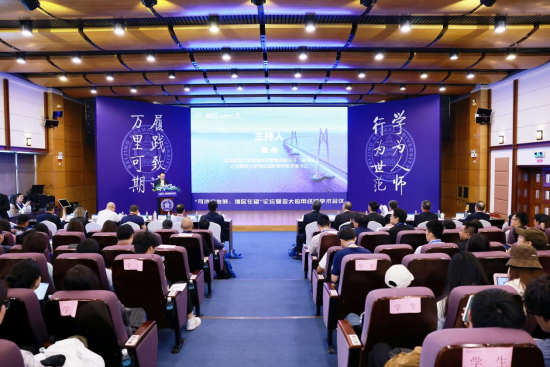
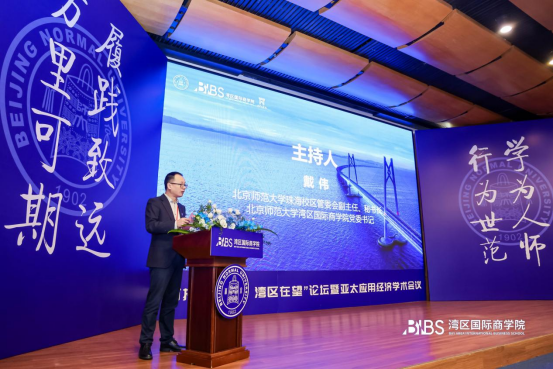
Bay Area’s Future: Gathering Profound Insights
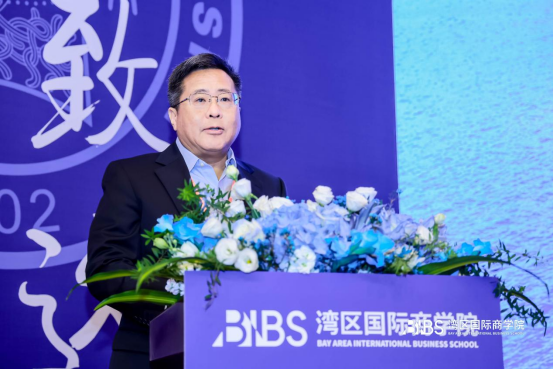
WANG Shoujun, Member of the Standing Committee of the Party Committee at Beijing Normal University and Vice President, as well as the Director of the Administrative Committee of the Zhuhai Campus, stated that, as President Xi Jinping has emphasized, “contribute Chinese wisdom to promote the sustainable development of human society.” This forum focused on the goals of sustainable development and explored the harmonious coexistence of people and nature, technology and culture, as well as the past and the future. The Zhuhai Campus of Beijing Normal University is an integral part of the “One University, Two Campuses” plan for the university. It is rooted in the GBA, aligning with national major development strategies and leveraging the university's disciplinary strengths. Through this forum, the hope is to concentrate on the sustainable development of the GBA and the new paths for industrial empowerment, seeking fresh ideas and directions for the region’s future development. As a pioneer in national economic development, the GBA is expected to provide a strong example and guidance for global sustainability.
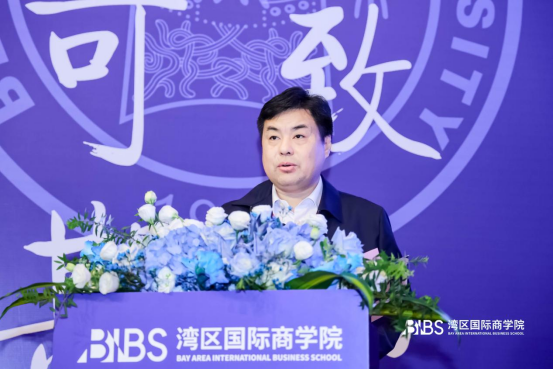
LIU Zhenjiang, the Deputy Secretary of the Municipal Party Committee of Qiqihar in Heilongjiang and deputy-mayor-level leader of Zhuhai City on secondment, expressed in his speech that as an indispensable part of the Greater Bay Area, Zhuhai has always adhered to the principles of open, innovative, green, and sustainable development. The expert teams from Beijing Normal University and its Bay Area International Business School have closely collaborated with various departments in Zhuhai, providing valuable insights and recommendations for urban planning, policy formulation, and research and innovation. The future of Zhuhai envisions an international, modern, and intelligent city where education and research will play a core role. He looks forward to deeper and broader cooperation with Beijing Normal University and its Bay Area International Business School to jointly drive the development of Zhuhai and the GBA.
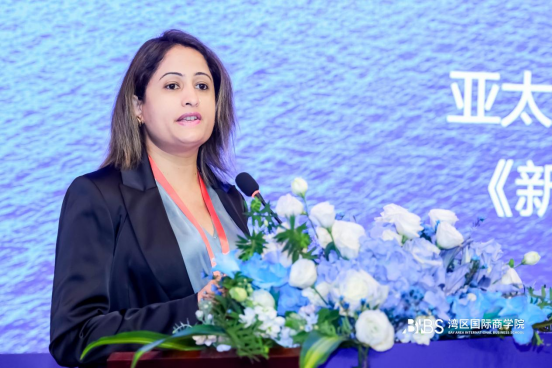
Representing the Asia-Pacific Applied Economics Association (APAEA), Susan Sharma, an Associate Professor at Deakin University in Australia and a founding member of APAEA, as well as a co-editor of the "Emerging Markets Finance and Trade" journal, congratulated the forum on its organization. She pointed out that sustainable development has become a widely recognized global consensus. In recent years, APAEA has collaborated with several Chinese universities, including Beijing Normal University's Bay Area International Business School, on conferences related to energy and economic sustainability. She expressed hope that this forum would result in the creation of more intellectual achievements through the exchange of ideas.
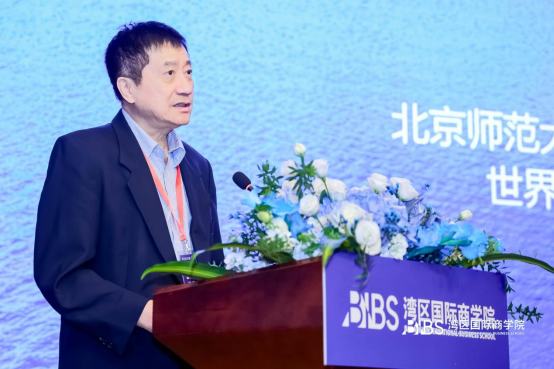
KONG Ying, the Dean of Bay Area International Business School and the President of the World Alliance for Low Carbon Cities, extended a warm welcome to all the guests on behalf of the school. He emphasized that the school is situated in a city with a commitment to openness, innovation, and green development. It considers it a responsibility and a determination to contribute wisdom to sustainable development in the GBA and globally. The school is dedicated to creating an efficient platform for educational exchange, uniting world-class institutions, government strength, and top industry groups. Mr. KONG expressed his hope for future efforts in collaboration with all sectors of society to promote a deep integration of knowledge and practice and cultivate outstanding leaders for the GBA.
Subsequently, the Industrial Consultation Committee of Beijing Normal University's Bay Area International Business School was officially established. The initial members of the committee include prominent executives from well-known companies in the GBA. They will actively implement national economic, technological, and educational reform policies, providing strategies and recommendations for industry-academia-research collaboration, thus spurring cooperation in areas such as technological innovation, talent development, technology transfer, and industrial upgrading.
Illuminate the path towards sustainable development
The forum revolved around the theme of sustainable development in the GBA, featuring keynote speeches by leading figures from academia, government, and business sectors.
Firstly, Professor YANG Jun, a Fellow of the Canadian Academy of Engineering, a member of the Expert Committee of the International Coalition of Intelligent Manufacturing, Director of the China-Canada Innovation Center at the United Nations Industrial Development Organization (UNIDO), and a professor at Shenzhen Institute for Advanced Study, UESTC, delivered a keynote speech entitled From the Fourth Industrial Revolution to the Future of AI and Carbon-Based Intelligence. He emphasized that the evolution and development of the physical world and the digital world in a spiral manner would be an undeniable issue in the future. Professor YANG presented future prospects like genetic modification and digital immortality, sparking the audience's contemplation on "human development in the digital world."
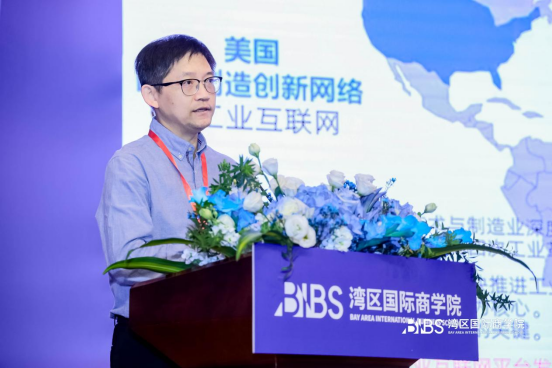
LI Haoran, a member of the Hong Kong Basic Law Committee of the Standing Committee of the National People's Congress, a member of the Legislative Council of the Hong Kong Special Administrative Region, Chief Strategic Officer for the GBA at China Resources Group, and a Director and Vice President of China Resources Enterprise, stressed the strategic significance of the GBA with its focus on integration, reform, innovation, and internationalization. He drew upon international bay area experiences, such as those of the New York Bay Area and the Tokyo Bay Area, to outline a development path for the GBA, evolving from core cities, extensive infrastructure development, to concentrated regional planning, industrial upgrades, success in strategic industries, and ultimately the establishment of an international bay area. He expressed hope that we would maintain confidence in the future and collectively contribute to the comprehensive development of our nation.
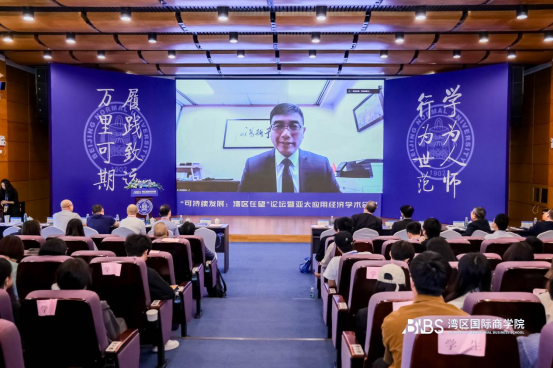
HUANG Zhongjian, the Deputy Director of the Economic Development Bureau of the Guangdong-Macao In-Depth Cooperation Zone in Hengqin, presented on the topic Industrial Layout and Development Opportunities in the Guangdong-Macao In-Depth Cooperation Zone in Hengqin. He provided an overview of the zone from four perspectives: introduction, integration, development, and support. To date, the zone has seen significant development in modern finance and other three emerging industries. It has implemented various measures, including providing housing resources and reducing corporate income tax, making outstanding contributions to the continuous prosperity of the GBA.
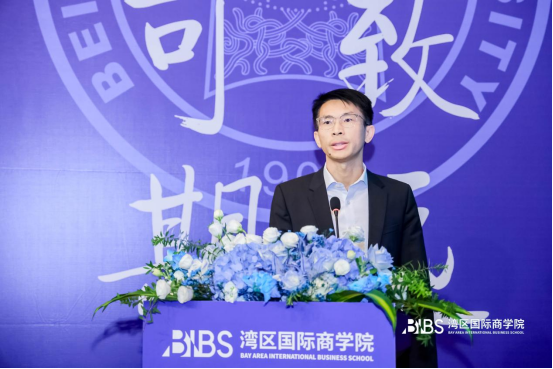
WEN Hong, the Vice President of Mingyang Smart Energy, and the General Manager of the Strategic Development Center, shared how the company, a front runner in the global high-end new energy equipment industry, perseveres in innovation for development. The company is dedicated to creating a new energy industry ecosystem focusing on wind and solar hydrogen storage, with the ultimate goal of realizing the Mingyang Dream of reaching a hundred billion revenue.
LI Zhuwen, the Director of Sustainable Development at CIMC Group and an expert in the ESG Research Group of the China Association for Public Companies, shared how CIMC Group is making relentless efforts to create high-quality products, contribute to the nation's essential equipment and pursue better life. He also discussed how the group integrates ESG principles into its corporate strategy, operations, and business practices to build genuine competitiveness in sustainable development. This commitment to responsible business practices aligns with their goal of achieving lasting success and creating a better world.
ZHENG Xueqi, the Chief Financial Officer (CFO) of AAMI, an advanced semiconductor group in Hong Kong, shared how AAMI, as a multinational high-tech company integrating design and manufacturing, proactively shoulders the responsibilities of the era. They transform the challenges of green development into opportunities and actively explore sustainable and innovative development in the advanced manufacturing field.
WEI Dongqing, the Deputy Secretary of the Party Committee and the Executive Director of the Hong Kong-Zhuhai-Macao Bridge Authority, shared how the construction of the Hong Kong-Zhuhai-Macao Bridge was a decade-long endeavor that embodies the spirit of hard work and innovation in China's infrastructure development, symbolizing the determination to overcome any obstacles. Currently, the project is actively exploring innovative approaches in the field of engineering cultural and creative products to enhance China's soft power in the engineering sector.
WEI Shunbing, a member of the Preparatory Committee of Zhuhai Ocean Development Group and General Manager of the Strategic Investment Center of Zhuhai Jiuzhou Holdings Group, shared the latest developments in the marine industry and discussed how to explore the future path of modern marine "blue" ranch. This initiative aims to contribute to the sustainable development of the marine economy in the GBA.
The concurrent Asia-Pacific Applied Economics Academic Conference primarily focused on six themes: Environment and Global Trade, Risk and Financial Market Pricing, Corporate Governance and Financial Leverage, Energy Markets and Spillover Effect, Public Policies for Inclusive Growth, and Analysis of Unethical Behavior. These conferences and parallel subforums attracted numerous experts and young scholars from the GBA, collectively canvassing how to achieve economic prosperity, ecological balance, and social equity within the development process of the Bay Area.
This forum, jointly hosted by the BIBS and the APAEA, is dedicated to establishing an open and diverse platform for collaboration and exchange in the Asia-Pacific region. It aims to drive profound interactions among the community, academia, and industrial sectors. Leaders from various industries in the GBA, along with young talents, gathered to share the latest research findings and practical experiences in sustainable development. Together, they explored the significant challenges and opportunities facing sustainable development and contributed valuable insights and recommendations for the GBA and global sustainability efforts.
The Bay Area International Business School employs an international management system, leveraging the GBA to create a higher education platform that integrates world-class institutions, governmental support, and top industry groups. In terms of academic disciplines, the school covers both traditional business subjects and offers applied disciplines based on the current digital economy. Additionally, it places a strong emphasis on crucial sustainable development topics such as energy transition, ESG assessment, AI, and financial technology. It actively recruits outstanding scholars from both domestic and international backgrounds, driving cutting-edge academic research in economics, finance, accounting, and management. The school also fosters deep collaboration with relevant enterprises in the GBA, encouraging the integration of production, education, research, and application to support the rapid development of the GBA.

